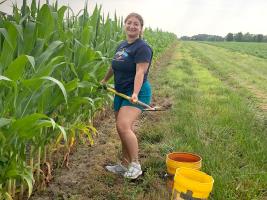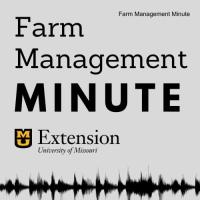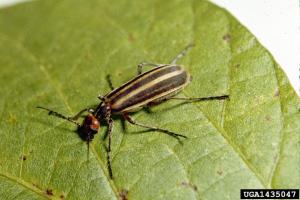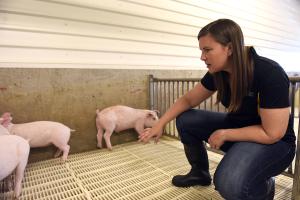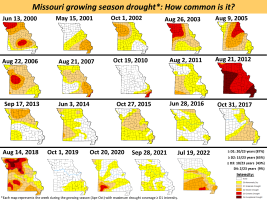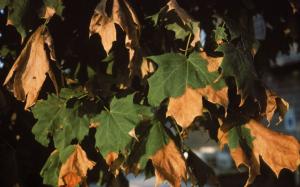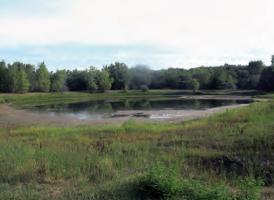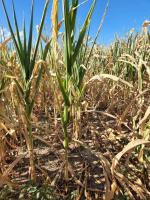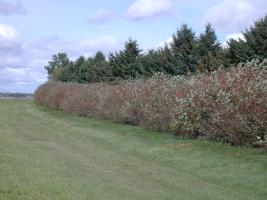Golden rule for dorm room plants: Keep it simple
COLUMBIA, Mo. – One way to spruce up a college dormitory room is to add plants, says University of Missouri Extension horticulturist Michele Warmund.Dorm rooms can appear a bit bare and dreary, Warmund says, but plants can add color and provide a pleasant atmosphere. “After spending the day in lecture halls, a plant-filled dorm room can be a nice place to study or relax with friends,” she says.
Plan to meet weaning challenges
SEDALIA, Mo. – Weaning spring calves may be more of a challenge this year because of short pasture supplies and the questionable nutritional value of this year’s hay crop.“Pay very close attention to body condition score in September and be prepared to wean, if necessary,” said Gene Schmitz, University of Missouri Extension livestock specialist in Sedalia.Schmitz recently worked through a feeding scenario for a producer that highlights…
Drought recovery forage options
GALENA, Mo. – “If there was ever a year to focus on stockpiled tall fescue, this is it,” says Tim Schnakenberg, University of Missouri Extension agronomy specialist in Galena.
11 undergraduates intern with MU Extension
COLUMBIA, Mo. – Eleven undergraduates have been busy interning with University of Missouri Extension this summer as part of the MU Integrated STEM Internship Program. Interns work with a research mentor on the MU campus and also support extension programming around the state.
4-H Foundation endowment funds reaching many Missouri counties
County endowment funds created by the Missouri 4-H Foundation have had a significant impact on many Missouri counties within the last year. The Foundation currently manages six county endowment funds benefiting Barton, Callaway, Dade, Henry, Pike and St. Charles counties.
Former FRTI directors honored by National Fire Heritage Center
Kevin Zumwalt, left, and David Hedrick, right.COLUMBIA, Mo.
Apply fall nitrogen now to boost forage stockpiles
COLUMBIA, Mo. – University of Missouri Extension nutrient management specialist John Lory recommends applying fall nitrogen in mid-August to cool-season pastures.Despite drought conditions in much of the state, Lory says, “we need to get nitrogen applied now so we can take full advantage of the rains when they do arrive.”
August farm management news and notes from MU Extension
COLUMBIA, Mo. – Farms constantly adapt to become more productive and successful. As you reflect on farm activities through this summer, consider these news and notes from University of Missouri Extension. They can help you keep your farm safe and plan a profitable, sustainable future.Avoid summer forage slump with native warm-season grasses
Blister beetles reported in high numbers
COLUMBIA, Mo. – Farmers, livestock owners and gardeners across the state report that blister beetles are appearing in large numbers this summer, says Pat Miller, University of Missouri Extension agronomy specialist. Blister beetles produce a toxin that can harm livestock.The toxin, called cantharidin, can cause animals to become sick and even die. Cantharidin is a stable toxin, so even the dried remains of beetles in hay remain…
Program helps pork producers secure their biosecurity plans
COLUMBIA, Mo. – The Rapid Access Biosecurity app can help in the event of a transboundary or foreign animal disease outbreak in the U.S., said Corinne Bromfield, University of Missouri swine extension veterinarian.The web-based RAB app helps pork farmers get their Secure Pork Supply Plans in a format regulatory officials can access quickly when needed and approve plans and provide permits when requested, Bromfield said.
Drought requires feed efficiency in cattle
WEST PLAINS, Mo. – Low supplies of hay make feeding cattle a challenge.Elizabeth Picking, a University of Missouri Extension livestock specialist in southwestern Missouri, sees the effects of severe drought in her area – dwindling hay supplies, poor-quality hay, high prices and ponds going dry.
SW Missouri no stranger to drought in forages
WEST PLAINS, Mo. – Southwest Missouri farmers and livestock producers are no strangers to drought. In 2022, livestock owners face short-term and long-term challenges growing pastures for grazing and winter feeding.
How to help your trees recover from drought
COLUMBIA, Mo. – Dry soil conditions can significantly reduce the life span of valuable landscape trees.“Because they are difficult and expensive to replace, your trees need attention during and after periods of drought,” says University of Missouri Extension state forestry specialist Hank Stelzer.
Short forage supplies require producers to make tough decisions
COLUMBIA, Mo. – Dry weather and short pastures have reduced forage supplies, prompting livestock producers to ponder “could have, would have, should have” scenarios, says University of Missouri Extension livestock specialist Eric Meusch.Producers should try to match their herd needs to anticipated forage supplies, Meusch says. This requires planning before a drought. Many factors will be out of your control if you wait until drought…
How to manage drought-stressed ponds
This is part of an MU Extension series to help with drought management.COLUMBIA, Mo. – Drought combined with high temperatures can have devastating effects on fish ponds, but pond owners can take steps to alleviate these effects.
Tough culling decisions come with drought, forage shortages
COLUMBIA, Mo. – With dry weather and short pastures, Missouri cow-herd owners face tough culling decisions. One way to match cows’ needs to available grass is to sell cows.Give careful thought to which grass eaters go first, says Eric Bailey, University of Missouri Extension beef nutritionist. Under drought stress, identifying those cows becomes urgent.
Nitrate, prussic acid poisoning follow drought
COLUMBIA, Mo. – Nitrates and prussic acid build up in forages to levels dangerous to livestock during drought.Livestock face severe illness and even death after eating affected forages, says University of Missouri Extension agronomist Jamie Gundel.Nitrates tend to concentrate in the bottom third of the plant. It shows in the plant’s stem and stalks more than leaves, Gundel says.
Corn silage as a forage
COLUMBIA, Mo. – An emergency feeding situation is shaping up for Missouri’s beef producers because of the drought. University of Missouri Extension recently hosted University of Wisconsin agronomist Joe Lauer on the MU Extension Forage and Livestock Hour to discuss his research on corn silage as a forage.
Missouri dairy producers have their eyes on the drought
COLUMBIA, Mo. – Northern Missouri has received plenty of rain, and dairy producers there are hopeful about making a silage pile, while those in the state’s southern counties are looking at options as drought conditions and oppressive heat have taken hold.
MU guide looks at reconsidering silage pricing
COLUMBIA, Mo. – Drought throughout much of Missouri has renewed interest in how to price silage. An updated University of Missouri Extension publication looks at silage costs and revenues.
Windbreaks can help prevent herbicide injury
COLUMBIA, Mo. – Plant injury due to the off-target movement of herbicides such as dicamba and 2,4-D is one of the challenges to the production of specialty crops.“There are few short-term solutions to avoid plant damage when herbicides drift onto property other than growing plants in protective structures or planting crops and cultivars that are less susceptible to herbicide injury,” says University of Missouri Extension horticulturist…
Time to transplant irises
COLUMBIA, Mo. – Now is the time to transplant one of America’s most popular flowers, the iris.Although irises can be transplanted at any time, they do best when established in the landscape from August to mid-October, said University of Missouri Extension horticulturist David Trinklein.
Plants respond to heat differently than humans
COLUMBIA, Mo. – Extreme heat affects plants differently than humans.With triple-digit temperatures this summer, grain crop growers should understand how heat affects plants, says University of Missouri Extension agronomist Bill Wiebold.First, human concepts such as “heat index” or “feels like” do not apply to plants, Wiebold says. People and plants feel and react differently to heat.
MU Engagement Scholar interview: Kale Monk
Six University of Missouri faculty members have been selected as the inaugural group of MU Engagement Scholars. The scholars were selected by the Office of Extension and Engagement for their potential to create dynamic engagement opportunities for Missourians.
Let no tree go to waste, Full Circle Forest Products - Rutledge, MO
Are trees that have been felled by nature or landowners destined to rot — either where they lie or in a landfill? Joshua Clarkweiss says no. Clarkweiss, owner of Full Circle Forest Products, a sustainability-focused sawmill in Rutledge, Missouri, turns those trees into custom construction lumber and furniture.


